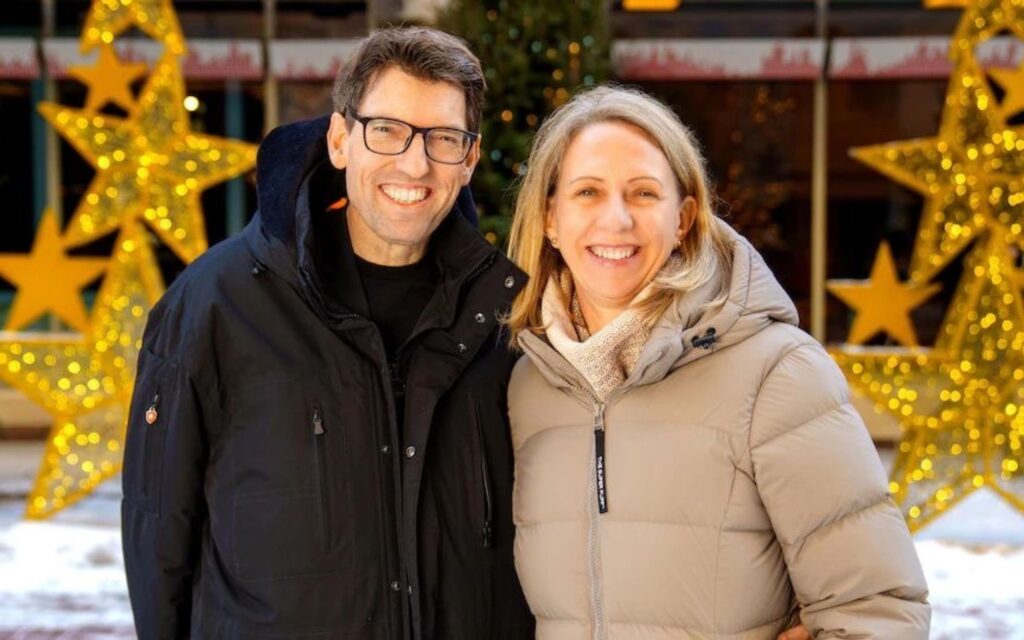
Story of immigration to Canada
Catherine Clark: You had a tumultuous first few years of life before immigrating to Canada from Hong Kong with your family. Can you tell us what you remember about those days, which many Canadians may not even know about you?
Adrienne Clarkson: I was only two and a half, but I do believe that things are imprinted in you, even if you don’t verbally remember them and you can’t write them down. We nearly did not get out of Hong Kong. The reason why we were able to get on that refugee exchange ship, with Canadians and Americans who were being taken out of Japan and Hong Kong and Singapore and Vietnam, it’s a dramatic story.
The reason why we were put on the ship was because my father had been a young businessman, very successful already by the age of 30. He’d done extremely well. And he was very connected with the Canadian Trade Commission in Hong Kong. And so, when we were living under the occupation, he wrote to them, and he never said, “Can you get us out of here, in any way help us?” And we never heard a single thing until one night in June, their door was knocked on. There were two Japanese soldiers — they were the Kempeitai, the equivalent of the SS in Germany, the Elite Guard — and they said, “You are on the list of Canadians to be repatriated to Canada. Be where the ship will be leaving tomorrow morning at 11. You must be there by dawn.”
So, my parents had about eight hours to decide whether they would leave their parents, their family, everything, and just depart with us, my brother and me and one suitcase each, and that was it. That moment of courage, that moment of saying goodbye to my grandmother who had recently been widowed, saying goodbye to aunts and uncles, all overnight.
My father actually said to me, after I had written my autobiography, that the chances of getting on that boat were so slim, really, because we were the only non-white people. The Red Cross exchange was for Canadian diplomats, American diplomats, and religious orders. The British were all interned in camps, but Canadians were not; they were exchanged. And as we were standing on the dock, they were checking us off on a list, and the man looked down at us and turned to this other guy, another Canadian, I suppose, and said, “What are these people doing here? They’re not white.” And the other guy said, “Oh, well they’re here, they’ve got their bags, their name is on the list, we’ve got too much to do.” And in that moment, our fate was decided. They couldn’t be bothered because they were putting something like 1,800 people on this ship, so we got out. And so, wherever I see refugees clinging to things or saying, “Please help us,” or “You must get us out,” my whole body reacts in a way which is not intellectual.
Jennifer Stewart: Did your parents ever talk about the emotions that they were feeling and that they were mulling over during that eight-hour period that evening?
Adrienne Clarkson: No, they didn’t. They didn’t dwell on it. One of the things my parents gave to us was this relentless optimism and looking forward, never looking back. My father said, “What is really interesting is that this country has given us a chance, and we must never, never look back.” And he always was very strong on that. He always said, “You never look at what we lost. Just look at what we’re going to get.”
One of the things my parents gave to us was this relentless optimism and looking forward, never looking back.
Adrienne Clarkson
He really felt very strongly that Canadians were tremendously helpful, and that they cared about us. Ottawa was such a white city, even when I was growing up through my high school years. There wasn’t a Black family. There wasn’t a South Asian, Indian, or Pakistani family. There were Jews, there were us. And there were a few people who had Chinese restaurants. So, it was really very interesting how they had to be resilient.
My family had been Anglican since about 1860 or so, just after Hong Kong became a Crown colony, I suppose. Therefore, my mother and father looked immediately for a church and we went to Christchurch Cathedral, and that was our first point of contact. And we had people who looked after us. They helped us to find a doctor. They were always friendly. And Canada was officially still racist, right?
The Chinese Exclusion Act was on the books from 1923 on, and I have a page from that which somebody doing a Ph.D. in B.C. sent to me, which has my name registered in it as a nine-year-old. I don’t know if that was the last year, maybe, they registered before the Exclusion Act was done away with, but I was registered there at nine. And, I became Governor General of Canada. That’s the kind of country that Canada is, and that’s what I tried to do very much when I was Governor General — to tell people and people in the world when we did our state visits to Germany, to Chile, to Argentina, that we were a country that had a hideous past, just as awful as any others, but that we had been capable of change.
I tried to do this very much when I was Governor General — to tell people and people in the world, that we were a country that had a hideous past, just as awful as any others, but that we had been capable of change.
Adrienne Clarkson
Vision of the Governor’s General role
Catherine Clark: You were the first Chinese Canadian and only the second woman to assume the role of Commander-in-Chief. And you brought a different perspective to the role of Governor General; some people speak of it as breathing new life into the role. You were very visible. Why was that so important to you to be seen so visibly in this role? What kind of a difference were you trying to make?
Adrienne Clarkson: The Governor General is very important in the Constitution of Canada, a kind of highly coloured fire hydrant, only to be used in emergencies. The Governor General signs all the laws into assent, the Governor General opens Parliament. I never thought of it as a decor position. I’m very annoyed at the journalists who don’t understand or look it up. The Prime Minister is not mentioned in the Constitution of Canada. But the person who has a judgment on all of that is the Governor General.
The Governor General is very important in the Constitution of Canada, a kind of highly coloured fire hydrant, only to be used in emergencies.
Adrienne Clarkson
I knew that it was a very subtle position, and not able to be understood a lot. But I was very fortunate in that I had an excellent Prime Minister, Jean Chrétien. I really enjoyed working with him, because he knew so much politically. He knew all the rules about the relationship between the Prime Minister and the Governor General.
I’ll never forget the morning I was called at 7:30. The Prime Minister wanted to speak to me and he said, “I’m sorry, it’s early. But I wanted to tell you that this afternoon I’m going into the House to announce that we are not going to join the Americans in Iraq, and I have said ‘no’ to George Bush.” He was very correct in everything that he did because he knew the system. He looks like a casual person, but he is a very, very experienced politician. He knows what we are as a country, and he has always behaved accordingly.
Position of women in modern world
Jennifer Stewart: What inspires you right now, in this very difficult point in our history?
Adrienne Clarkson: I think I’m still keeping up with the feminist things. What I am still concerned about is the position of women. We think we have made inroads and we really haven’t. Let me just take a medical condition, for example. They didn’t know how women really presented with heart conditions, because the big study on the heart had been done with 10,000 patients, 30 to 40 years ago, and they were all men. They know a lot about how men present with heart conditions. They don’t know about women.
I had endometriosis, which I’ve never written about or talked about publicly, but I am going to because I realize I’m reading about it all the time now — women have endometriosis, it’s still a primary cause of infertility, having to have radical surgery to your organs, etc. I had surgery for endometriosis when I was 21, which is 60 years ago. And they seem to still kind of do the same kind of thing.
If men got endometriosis, they wouldn’t be doing that 60 years later, it would be different, they would be finding ways not to have endometriosis. They would be pouring money into that.
Adrienne Clarkson
The patriarchy still subliminally resents women because women control life. Only women give birth, only women can really decide if they’re going to give birth. So, all the stuff you’re seeing happening in the United States, in Texas, and so on, about abortion, it’s about the patriarchy reasserting itself in its most hideous manner, to say women do not control their own bodies. And I think that’s still something that we have to work on.
The patriarchy still subliminally resents women because women control life. Only women give birth, only women can really decide if they’re going to give birth.
Adrienne Clarkson
Catherine Clark: Do you think that we will ever reach a stage of true equality?
Adrienne Clarkson: Not in my lifetime. And certainly, I don’t think, in yours. I’m worried about my grandchildren’s age, 18 to 20 years old. Because we’ve become such an affluent country. When I tell people that we didn’t have a car ‘til I was 12, I don’t feel that we were deprived, because nobody that I knew had a car. That was the kind of country we were. We were not a rich country; money wasn’t everything. And what our problem is in Canada is that we have this sense of entitlement and richness and the feeling that we have all this stuff, but we haven’t earned it really. What are we doing for other people? How can we have 5,000 children in shelters in Toronto? How can we have a city council that seriously considers cutting a million dollars out of its budget, and doing away with breakfast programs for children in schools? How can we do that? And yet, you see the obscene wealth that is flaunted everywhere.







